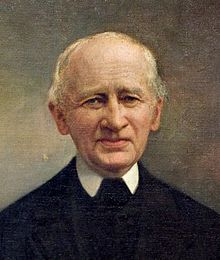Johann Gottfried Galle
| Johann Gottfried Galle | |
|---|---|

Johann Gottfried Galle
|
|
| Born | June 9, 1812 Radis, Germany |
| Died | July 10, 1910 (aged 98) Potsdam, Germany |
| Nationality | German |
| Fields | astronomy |
| Institutions |
Berlin Observatory University of Breslau |
| Alma mater | University of Berlin |
| Known for | Discovery of Neptune |
| Notable awards | Lalande Prize (1839) |
| Signature | |
Johann Gottfried Galle (9 June 1812 – 10 July 1910) was a German astronomer from Radis, Germany, at the Berlin Observatory who, on 23 September 1846, with the assistance of student Heinrich Louis d'Arrest, was the first person to view the planet Neptune and know what he was looking at. Urbain Le Verrier had predicted the existence and position of Neptune, and sent the coordinates to Galle, asking him to verify. Galle found Neptune in the same night he received Le Verrier's letter, within 1° of the predicted position. The discovery of Neptune is widely regarded as a dramatic validation of celestial mechanics, and is one of the most remarkable moments of 19th century science.
Galle was born in the Papsthaus (a house in the Pabst wood) 2 km west of Radis in the vicinity of the town of Gräfenhainichen, as the first son of Marie Henriette née Pannier (1790–1839) and Johann Gottfried Galle (1790–1853), an operator of a tar oven. He attended the Gymnasium in Wittenberg and studied at Friedrich-Wilhelms-Universität Berlin from 1830 to 1833 . He became a teacher at the Gymnasium in Guben, teaching mathematics and physics. Later on, he transferred to the Gymnasium in Berlin.
He had started to work as an assistant to Johann Franz Encke in 1835 immediately following the completion of the new Berlin Observatory. Galle worked there for the next 16 years, making use especially of a Fraunhofer-refractor with 9 Zoll (22,5 cm) aperture. In 1838 he discovered an inner, dark ring of Saturn. From 2 December 1839 to 6 March 1840 he discovered three new comets.
...
Wikipedia
